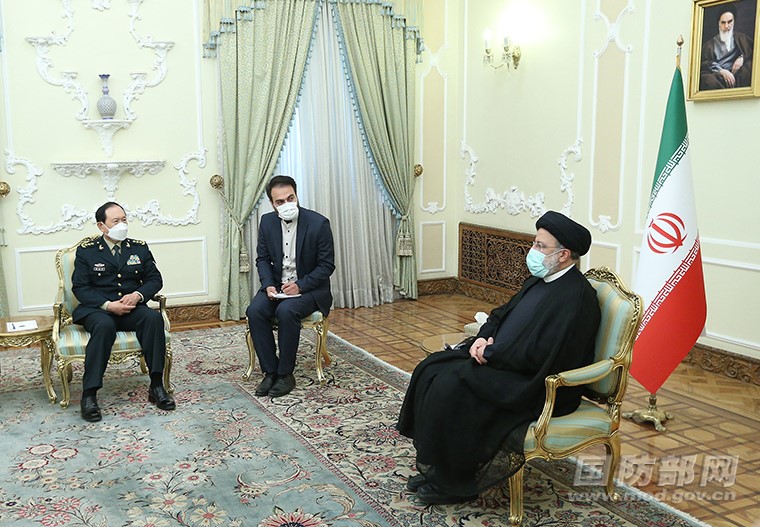Although dramatic and intense events are unfolding by the hour in the Russian war in Ukraine, the US cannot afford to take its eyes off of the other bad boy in the international community. China continues to push up the global threat level from its intensifying military collaboration with Iran to its aggressive efforts in the Solomon Islands in the southwestern Pacific Ocean.
Earlier this week Chinese Defense Minister Wei Fenghe visited the Iranian capital for discussions with Iranian Armed Forces Chief of Staff Maj. Gen. Mohammad Bagheri concerning expanding the ties between the two countries’ militaries. “In today’s meeting with the Chinese Minister of Defense, it was agreed to develop bilateral cooperation in the field of holding exercises, exchange of experiences, training issues and other common fields between the armed forces of the two countries so that we can provide better security for the regions under our control,” Bagheri said. China joined Iran and Russia in joint naval exercises in 2019 and again earlier this year just prior to the start of the war in Ukraine. But China is not only actively pursuing its military relationships in the Middle East/Persia, it also is continuing to push the boundaries of its influence in the Indo-Pacific region.
Last week China signed a formal security cooperation agreement with the Solomon Islands. If China gets a toehold there, it could lead to military ship visits, a naval base, and further militarization of the Indo-Pacific region. A version of the document leaked last month indicates that China intends “help maintain order,” according to John Ruwitch of NPR. This could include sending in Chinese soldiers, conducting military training, and naval ship visits. The Solomon Islands are slightly over 2,000 miles from Australia. The leaked draft of the bilateral cooperation document raises serious concerns for Australian officials who believe a Chinese military base would allow Beijing to project power further into the Pacific and pose a potential threat to Australian national security interests.
China is a strategic, patient, long-term planner that has been active behind-the-scenes for several years in the Solomon Islands. Beijing first provided the country economic assistance. It then turned that aid into a diplomatic cache followed by the signing of the security agreement in April. China has repeated this pattern in many countries where it seeks to constrain the United States’ influence or to improve Beijing’s image or military position. The geopolitical location of the Islands places it squarely between the US and its allies in the area and near key commercial shipping lanes. Prime Minister Manasseh Sogavare, who is up for re-election, is a strong supporter improving relations with China. The Biden Administration in Washington reacted to the situation this week when Daniel Kritenbrink, US Assistant Secretary of State for East Asian and Pacific Affairs, said on Monday: “We have respect for the Solomon Islands’ sovereignty, but we also wanted to let them know that if steps were taken [by China] to establish a de facto permanent military presence, power projection capabilities or a military installation, then we would have significant concerns and we would very naturally respond to those concerns.” Typical of the Biden Administration’s foreign policy, the announcement to reporters contained no details on how Washington would change the direction of the Solomon’s away from the Chinese security orbit. Kurt Campbell, the National Security Council’s Indo-Pacific coordinator, and Kritenbrink traveled to the Honiara last week in reaction to the announced agreement and to attempt to reverse the impression that the United States is in retreat across the Indo-Pacific at a time when security concerns in the area are swelling due to Chinese belligerence. Michael Ausin of the Hoover Institution points out in Politico that is going to be difficult for the US to make up for years of neglect. The Clinton Administration closed the US Embassy in in the Solomon Islands in 1993. Auslin suggests giving Sogavare whatever he wants to block China’s advances. To date, Sogavare has refused to release details of the security cooperation document to officials in Washington. China is a strategic player and likely timed the signing when it knew Washington was busy responding to the kinetic conflict in Europe. If the Solomon’s Prime Minister is playing “the China card” with the Biden Administration, it is a dangerous game with long-term consequences for the region.
Photo: Iranian President Ebrahim Raisi (R) meets with visiting Chinese State Councilor and Defense Minister General Wei Fenghe in Tehran, capital of Iran, on April 27, 2022. (mod.gov.cn/Photo by Li Xiaowei)
Daria Novak served in the U.S. State Department, specializing in China
